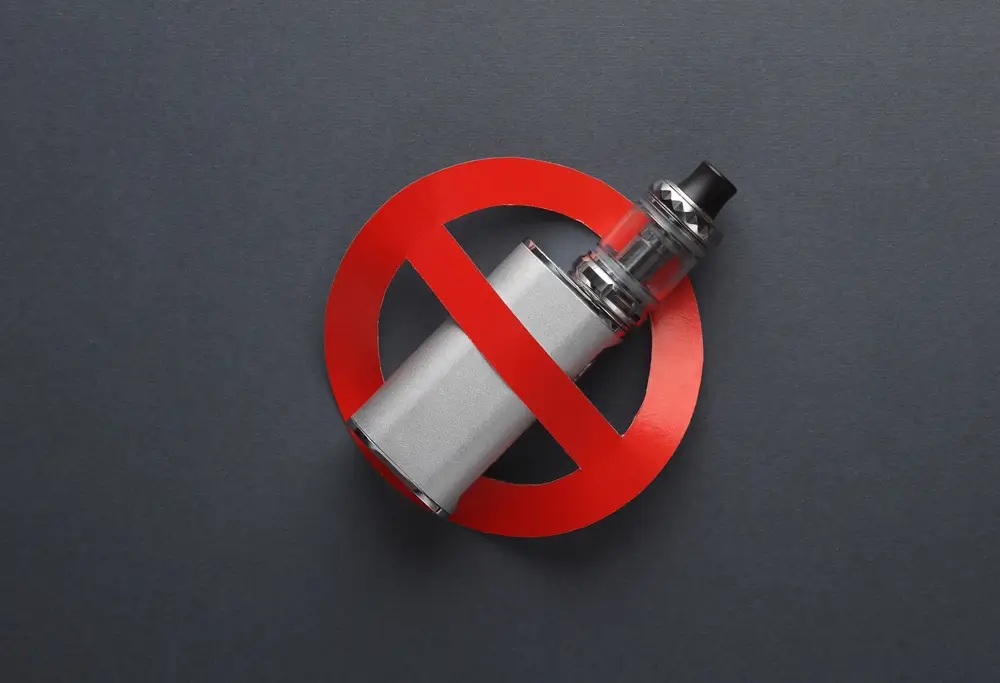In recent years, vaping has emerged as a popular alternative to traditional cigarette smoking, especially among younger generations. Approximately 2.13 million youth reported using e-cigarettes, which is another term used for vaping products. With its sleek devices, flavorful e-liquids, and the perception that it is safer when compared to smoking, vaping has gained widespread acceptance. However, concerns have been raised about potential health implications, including mental health effects like anxiety. This article examines the relationship between vaping and anxiety and the science behind it.

What is Vaping?
Vaping involves inhaling and exhaling aerosol, often referred to as vapor, produced by an electronic cigarette or similar device. These devices typically heat a liquid solution containing nicotine, flavorings, and other chemicals to generate the aerosol. While vaping lacks the combustion of tobacco, it still delivers nicotine, which is highly addictive and known to have psychoactive effects on the brain.
The Negative Effects of Vaping
Vaping, while often marketed as a safer alternative to traditional cigarette smoking, carries its own set of negative effects, some of which include:
- Addiction: Vaping products often contain nicotine, which is highly addictive. Regular vaping can lead to dependence, making it difficult for individuals to quit.
- Respiratory Issues: Vaping can cause respiratory problems such as coughing, wheezing, and shortness of breath. Long-term use may also increase the risk of developing conditions like bronchitis or asthma.
- Cardiovascular Risks: Nicotine in vaping products can increase heart rate and blood pressure, potentially leading to cardiovascular issues like heart disease and stroke, particularly in those with pre-existing conditions.
- Lung Damage: Some studies suggest that vaping can cause lung damage, including inflammation and impaired lung function. Cases of severe lung injury, known as EVALI (e-cigarette or vaping product use-associated lung injury), have been reported, often linked to vaping THC-containing products or those containing certain additives.
- Exposure to Harmful Chemicals: Vaping liquids may contain harmful chemicals aside from nicotine, including flavorings and additives. Heating these substances can produce toxic byproducts, some of which may have long-term health consequences.
- Brain Development in Adolescents: The use of nicotine during adolescence, whether through vaping or other means, can harm brain development, impacting cognition, attention, and impulse control.
- Gateway to Smoking: There are concerns that vaping may act as a gateway to traditional cigarette smoking, particularly among young people. The appealing flavors and marketing tactics used by vaping companies may make it more enticing for non-smokers to start using nicotine products.
- Secondhand Exposure: Vaping also poses risks to non-vaping individuals through secondhand exposure to the aerosol emitted by vaping devices. While it typically contains fewer harmful chemicals than cigarette smoke, it still may contain potentially harmful substances.
The Link Between Vaping and Anxiety
Some studies suggest a connection between vaping and anxiety. Many individuals report experiencing heightened levels of anxiety after vaping, particularly among those new to vaping or using high-nicotine products. However, establishing a direct relationship between vaping and anxiety proves challenging due to various factors at play.
Nicotine, the primary psychoactive component in tobacco and many e-liquids is known to modulate neurotransmitter activity in the brain, including dopamine and norepinephrine. While nicotine can initially produce feelings of relaxation and euphoria, its effect on anxiety is substantial. While some users may find temporary relief from anxiety symptoms through nicotine use, others may experience increased anxiety, especially during withdrawal periods or when consuming higher doses.
Psychological Factors
Beyond the pharmacological effects of nicotine, psychological factors also play a significant role in the relationship between vaping and anxiety. For many individuals, vaping serves as a coping mechanism for stress and anxiety. However, reliance on vaping as a stress management tool can lead to dependency and exacerbate anxiety symptoms, creating a vicious cycle of dependence and distress.
Social and Environmental Influences
The social and environmental contexts in which vaping occurs can further influence its impact on anxiety. Peer pressure, social norms, and the normalization of vaping within certain social circles may contribute to increased anxiety, especially among individuals who feel compelled to vape to fit in or alleviate social discomfort. Additionally, concerns about the long-term health effects of vaping and uncertainty surrounding product safety can contribute to heightened anxiety levels among users.

Research Findings on Vaping and Anxiety
Scientific research on the relationship between vaping and anxiety is still evolving, with conflicting findings complicating our understanding of the issue. While some studies suggest a positive correlation between vaping and anxiety, others fail to establish a clear connection. Methodological differences, variations in sample populations, and the diversity of vaping products and usage patterns contribute to the inconsistency of research findings.
One study published in the Journal of Affective Disorders found that young adults who used e-cigarettes were more likely to experience symptoms of anxiety and depression compared to non-users. However, the cross-sectional nature of the study limits its ability to determine a connection, and additional research is needed to interpret the temporal relationship between vaping and mental health outcomes.
Another study published in the journal Addictive Behaviors examined the association between vaping and perceived stress among college students. The researchers found that frequent vapers reported higher levels of perceived stress compared to non-vapers, suggesting a potential link between vaping and stress-related outcomes. However, the study’s reliance on self-reported data and the absence of objective measures of stress and anxiety require a cautious interpretation of the findings.
Find Help to Overcome Vaping and Anxiety
The relationship between vaping and anxiety is complex, but many individuals who vape feel that their anxiety is heightened because of it. This increase in anxiety is influenced by various factors, ranging from nicotine exposure to psychological and social dynamics. The effects of vaping on anxiety vary from person to person – requiring an individualized approach to dealing with vaping and anxiety.
Launch Centers understands the struggle that younger adults face when vaping. Whether they are experimenting with it or are a long-term user, overcoming an addiction to vaping can be hard, especially on your own. Our trained staff understands that vaping has been linked to increased anxiety and works closely with our clients to create a course of action that supports them every step of the way.
If you or a loved one is struggling with a vaping addiction and increased anxiety, reach out today to find out more about Launch Centers’ treatment options.





